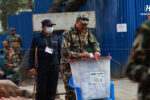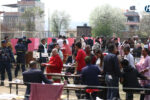KATHMANDU: More than 1000 cargo containers with goods imported by Nepali traders for Dashain and Tihar festivals are stuck at the Tatopani border as China has not allowed them to enter Nepal.
As a result, Nepali businessmen have been hit hard as the Chinese authorities have allowed only 6 to 10 containers to enter from the Tatopani checkpoint in Nepal’s Sindhupalchowk district, and 4 to 9 containers from Kerung daily.
Even though a limited number of people are allowed to enter Nepal, the export of Nepali goods is also prohibited.
Traders say the Chinese authorities have been allowing a limited number of containers to enter Nepal.
Economist Achyut Wagle says that Nepali traders have not been able to raise their voices even though they are compelled to throw away their goods due to the undeclared blockade.
Wagle said that China has blocked the checkpoints on the pretext of coronavirus pandemic.
“What if India had closed the checkpoints on the same grounds?” he queried.
Wagle said besides border encroachment by China, Nepal has been incurring a trade deficit in the ratio of 1:30 with China due to the undeclared blockade.
“The question is: what would have happened in Nepal if India, too, imposed an undeclared blockade?” he asked, referring to what he said was a competition to show oneself more nationalist by being vocal about the anti-Indian narratives in Nepal.
Former Ambassador Vijay Kant Karna, too, raised concern over China’s high-handedness and undeclared blockade in major border points, including Tatopani and Rasuwa, especially during the festive season.
Meanwhile, efforts are being made to ease the situation.
The Chinese announcement to make Nepal a land-linked country has been limited to papers.
He added that the then Oli government had signed a transit agreement with China but no benefits had been achieved.
He said that there has been a “show of nationalism” when the agreement was signed, but the voices have been softer as China failed to implement it.
According to Ashok Kumar Shrestha, President of the Nepal Himalayan Cross-Border Chamber of Commerce and Industry, this has incurred a hefty loss to Nepali traders.
Items such as clothes, apples, electrical items, and other goods meant for Dashain and Tihar festivals have been stuck at Khasa.
Narad Gautam, Chief of the Tatopani Dry Port Customs Office, said that the Chinese side has allowed limited containers to enter Nepal on a daily basis.
The Chinese side has been stopping containers to enter Nepal from the Tatopani checkpoint that has remained closed after the 2015 earthquake.
Nepali traders who were making a good income from the Tatopani business before the earthquake are now in trouble.
About 1,500 containers belonging to the Nepal Truck Container Association and the Mini Truck Association, which were in operation before the earthquake, have not been able to operate smoothly of late.

It should be recalled that a transit agreement was signed between Nepal and China on March 21, 2016.
Nepal was then expected to be able to exercise its right of transit through Chinese territory and help increase Nepal’s exports.
Meanwhile, the transit protocol was signed on April 29, 2019, during President Bidhya Devi Bhandari’s state visit to China to implement the agreement.
As mentioned in Article 15 of the Protocol, the agreement had to be implemented exactly one month after each country informed the other of its enforcement.
According to the exchange of information on internal preparations, even though China provided the information with some delay, even though the protocol has to be implemented from February 1 this year, Nepal has not been able to reap the benefits so far.
China had, according to the protocol, allowed Nepal to use four open seaports and three open dry ports.








Comment